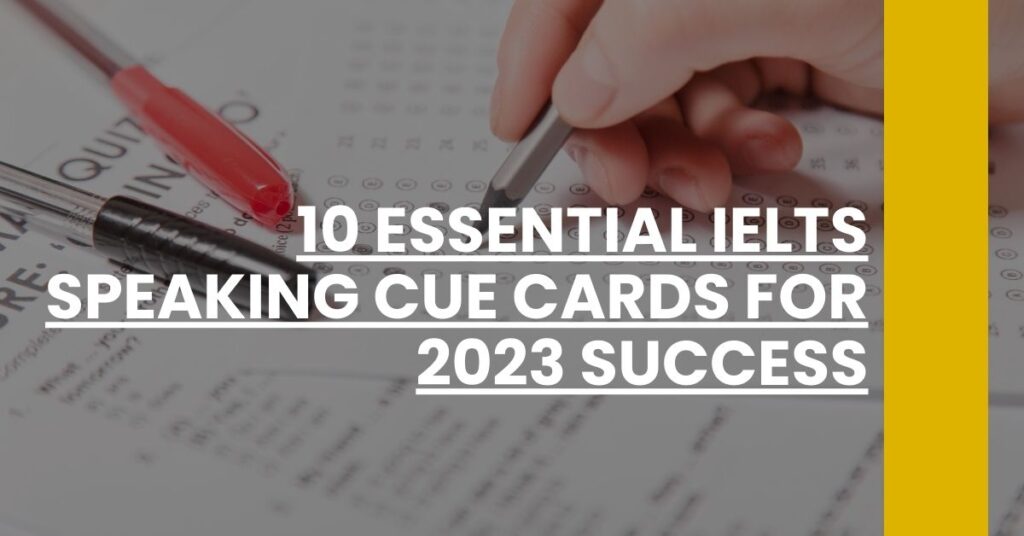Cracking the IELTS Speaking section can feel like deciphering an enigma, but what if the key lies in the mastery of IELTS speaking cue cards?
This article dissects the essentials, turning the daunting into the doable by arming you with strategies, examples, and insights.
Unlock the potential to elevate your Speaking score with precision-packed preparation that stands out. Here’s how to make the cue cards your stepping stone to IELTS triumph.
- 1. Decoding the IELTS Cue Card
- 2. Mastering Common IELTS Cue Card Topics
- 3. Strategies for Effective Cue Card Preparation
- 4. Sample IELTS Cue Card Responses
- 5. Overcoming Nervousness with Cue Cards
- 6. Timing Your Cue Card Response Perfectly
- 7. Leveraging Cue Cards for a Higher Speaking Score
- 8. Personalizing Your Cue Card Answers
- 9. Refining Pronunciation and Fluency Using Cue Cards
- 10. Post-Cue Card Discussion Techniques
- Conclusion: Solidifying Your Cue Card Technique
1. Decoding the IELTS Cue Card
If you find yourself gearing up for the IELTS speaking test, you’ll likely encounter a pivotal moment—the cue card. Think of the IELTS speaking cue cards as your personal roadmap to showcase your English language fluency and coherence. Each card presents you with a specific topic, followed by three to four questions designed to steer your monologue.
Akin to a mini-presentation, these cards assess your ability to think on your feet, organize your thoughts, and present them within a two-minute time frame. This includes one minute to gather your thoughts and jot down some notes—if you’re strategic about it, sixty seconds is all you need to create a mental outline for your response. It’s important to note that how you handle this segment can set the tone for the rest of your test—a well-executed cue card response primes you for success.
So, whether you’re describing your favorite book, a memorable journey, or a person who inspires you, mastering how to decode and deliver on these cue cards is crucial. The key to cracking the cue card code lies in understanding the questions and crafting a narrative that is both engaging and appropriately detailed.
2. Mastering Common IELTS Cue Card Topics
You might wonder, “How do I predict what will come up on the cue card?” While surprise is part of the test, some topics do frequent the roster more often than others. Your best bet is to prep far and wide. Here are several topics that are perennial favorites:
- Personal Experiences: Prepare anecdotes about significant life events.
- Describing Objects: Flesh out why certain objects are important to you.
- Favorite Things: Articulate why you prefer specific foods, places, or hobbies.
- Future Goals: Share your aspirations along with the ‘why’ behind them.
While it may be impossible to predict the exact cue card topic, you can control your preparedness level. Since these topics often revolve around personal experiences, dreams, and aspirations, the most persuasive responses are those rooted in authenticity—your stories and your emotions play the starring role here.
3. Strategies for Effective Cue Card Preparation
Succeeding with IELTS speaking cue cards isn’t just about what you say—it’s about how you prepare. Let’s explore some powerful strategies:
- Real Cue Cards: Use authentic prompt cards from reputable sources during practice.
- Note-taking: Develop a shorthand that enables you to jot down key points swiftly during the one-minute prep time.
- Recording Sessions: Record your responses and critique them—listen for fluency, grammar, and clarity.
- Peer Review: Practice with a friend or mentor who can provide constructive feedback.
These strategies are not just about building skill; they aim to boost your confidence, sharpen your memory, and enhance your ability to share coherent stories. Remember, preparedness sees opportunity in the unexpected, turning surprise into an asset.
4. Sample IELTS Cue Card Responses
Imagine being able to peek into a model response for an IELTS cue card prompt—experiencing firsthand what a compelling answer looks like. Here’s how that might play out:
Let’s say you pick a card that says, “Describe a time when you were very busy.” Your response could weave together narrative substances, such as:
- Setting the Scene: Detail when this busy period occurred and why it was so hectic for you.
- Describing Activities: Explain the tasks that filled your time, along with any emotions and challenges faced.
- Lessons Learned: Reflect on the experience—did it teach you about time management or resilience?
By structuring your response with clarity and depth, you’ll have set a high bar for your speaking test. Remember, quality sample responses are more than worth their weight in preparation gold. They help you grasp what a well-rounded answer encompasses.
5. Overcoming Nervousness with Cue Cards
Nervousness can be the unruly gatecrasher in the speaking test party. But with the right mindset and tools, you can reduce its presence to a mere whisper. Calming your nerves might look like this:
- Visualization: Close your eyes and envision delivering a flawless response.
- Deep Breathing: Adopt relaxation exercises to steady your heart rate and clear your mind.
- Practice Under Pressure: Simulate test conditions to become comfortable with the format.
- Positive Affirmations: Remind yourself of your abilities and hard work—self-assurance is key.
By incorporating these tips into your routine, you diminish the power of stress and open the door to clear, confident verbal expression.
6. Timing Your Cue Card Response Perfectly
Timing isn’t just a science, it’s an art. You’re tasked with making your spiel insightful, yet concise, all within a two-minute window—no pressure, right? To ensure you don’t underwhelm or overrun, consider these approaches:
- Cue Phrases: Start with phrases like “One thing to note…” to signal new ideas without abruptness.
- Dry Runs: Practice with a timer to develop a sense of the two-minute boundary.
- Pacing: Find a tempo in speech that’s natural yet keeps you on track.
Timing your response is about striking a balance. It’s about using every second judiciously to create an impact and demonstrate command over the English language.
7. Leveraging Cue Cards for a Higher Speaking Score
IELTS speaking cue cards are not just hurdles; they’re opportunities to illustrate your language prowess and rack up points in fluency, lexical resource, grammatical range, and pronunciation. Each of these areas is a piece of the puzzle that forms your overall Speaking score. Here’s how cue cards can serve to enhance each component:
- Fluency: Blend your ideas smoothly to create a free-flowing monologue without undue pauses.
- Vocabulary: Sprinkle in a variety of terms and phrases to exhibit your command of the English lexicon.
- Grammar: Employ a mix of sentence structures to show versatility in your grammatical use.
- Pronunciation: Articulate words clearly, with careful attention to stress and intonation patterns.
By honing your response on a cue card, you’re inadvertently polishing all the elements that matter for a stellar score. It’s about viewing each cue card as a canvas to paint your linguistic skills in the best light possible.
8. Personalizing Your Cue Card Answers
When it comes to IELTS speaking cue cards, the most compelling responses are those that reflect your personal touch. Personalizing your answers is key to captivating the examiner and adding authenticity to your speech.
- Share Personal Experiences: An anecdote from your life can transform a mundane response into a relatable story.
- Express Your Feelings: Show how the topic connects to your emotions; this brings warmth to your narrative.
- Include Unique Details: Specificity adds color and credibility to your answer, painting a vivid picture for your listener.
By weaving elements of your life into your responses, you make the content not only more relatable but also memorable. It’s about tapping into your experiences and packaging them in a way that conveys genuine engagement with the topic. This distinct personalization distinguishes your performance and demonstrates a comfortable command of English in nuanced ways.
9. Refining Pronunciation and Fluency Using Cue Cards
A key part of elevating your IELTS score revolves around pronunciation and fluency. These essential attributes can be honed effectively through dedicated cue card practice.
- Pronounce Clearly: Articulate each word carefully. Pay attention to challenging sounds and work to master them.
- Practice Intonation: The melody of your speech can express emotion, ask questions, or emphasize points.
- Use Rhythm: English has a natural rhythm. Getting comfortable with sentence stress patterns can improve your fluency.
Your objective is to make pronunciation and fluency your allies, using cue cards as the mechanism to fine-tune these skills. The IELTS speaking section gives you a fantastic platform to showcase your acumen in this area, and regular practice with cue cards will undoubtedly help lay the foundation for excellence.
10. Post-Cue Card Discussion Techniques
Now, let’s shift focus to what happens once the cue card is put aside: the interactive Part 3 of your IELTS Speaking test. Good news, the confidence and ability you’ve gained in the cue card section can be leveraged here too.
- Transition Smoothly: Use the concluding note of your cue card response to segue into a broader discussion.
- Expand on Ideas: Delve deeper into the topics introduced, showcasing your ability to discuss complex ideas.
- Ask Clarifying Questions: Engage with the examiner by asking questions if you need more context.
Elevating the discussion showcases not just your language skills but also your critical thinking. By mastering the art of nuanced conversation, you demonstrate to the IELTS examiners that your aptitude goes beyond prepared speech and that you’re equipped to partake in the dynamic flow of natural dialogue.
Conclusion: Solidifying Your Cue Card Technique
In essence, your IELTS speaking cue cards are the golden ticket to an impressive speaking score, and your meticulous preparation promises to make all the difference. Approach each cue card as an opportunity to shine and reflect not just your language proficiency but the unique individual behind the words.
The IELTS journey is one of both personal and linguistic growth. Each step of preparation is a building block towards your end goal—fluency that feels both effortless and engaging. So embrace the challenge, practice earnestly, and trust in your ability to sculpt powerful responses out of simple cue cards.
Your dedication to mastering cue cards signals a broader commitment to English proficiency. When the test date arrives, you will stand ready, reinforced by practice and poised with insight, prepared to engage the IELTS speaking section with unwavering confidence.
IELTS Speaking Cue Cards: Essential tool for acing the IELTS Speaking Test. Master topics, strategies, and boost your fluency.

